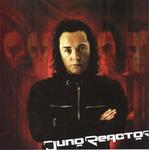Audio Visuals: Juno Reactor's Voice and the "Vertical Story"
The Per Contra Interview, Ben Watkins of Juno Reactor with Bill Turner
Ever heard Juno Reactor? The odds are very good that you have. Juno Reactor's fingerprints cover pop culture: from movies like "The Matrix" and "One Night in Mexico" to video games; the electronic music field with forays into world music, and it's evolved from art installations to orchestrations over the years, making a colorful history to accompany a colorful sound.
Hanging Around Art School
"My brother went to art school and his girlfriend went to art school. Then my girlfriend went to art school..." Ben Watkins says with a laugh, "...I sort of hung around art schools." It isn't necessary to understand art to enjoy Juno Reactor's unique music, but it plays a big part in the history, and for that matter even the name, of the band. Installation was a common interest for Watkins and his girlfriend. "We really loved that," he says.
And the art was quick to gain attention, though sometimes difficult to explain. For "The Missile Project" by Norma Fletcher, they placed a decommissioned missile on a truck and drove past the Parliament building in London. When a police officer questioned them about why they had a missile, Watkins replied "It's not a missile, it's art. Imagine saying that today," he continued between laughs, "It's not a bomb, it's art!"
Juno Reactor was the title of an element within "The Missile Project," a large concrete silo. "The original Juno Reactor was a seventy foot long structure that had bumps like a dinosaur's tail," Watkins begins to laugh, "and blew out smoke. I did the music 'Luciana' for it. But when she came up with the name and with the Juno Reactor being about the triple goddess, I thought, wow, this is the name I want." Fletcher liked the idea of bringing together several disciplines for art collaborations.
And what was it like trying to create music for a space?
"I think with Luciana, I knew what I wanted. I wanted to create the idea of the sun burning through space, the power. I wanted to create a monolith that had the power of recollection like a Solaris, a living being... I tell you, I scared myself shitless. I had to turn everything off and go home. It was too much. Then I came back and wrote the whole album in about fourteen hours, which was weird because someone had said 'Have you ever tried doing a one hour mix?'
I thought, well, no. Usually your conventions are that you do the three minute thing until you get bored with it and then you venture out into longer sorts of things. I'd never tried the hour and it was sort of a strange discipline. I mean you get five minutes in and you think, 'I don't want to start this again.'" How did he cope with the hour long arrangement? "I just thought, well, I'll move something every five minutes," he says, again laughing.
It later became the name of the band. He created experimental ambient music as a part of the installation. Asked if that background had helped him to incorporate a sense of space into his music, he acknowledged that it may have, but he sees his music in another way. Literally.
"Filmic" Music and the "Vertical Story"
Watkins explains the beginnings of his music with a little self-deprecation and hearty laughs. "I've found through a lot of the awful bands that I've been in and created, that have made pretty crap noises, I've found," he pauses, "maybe, the Juno Reactor voice." His qualification of the "maybe" belies a confidence in himself and the Juno Reactor voice that flows as he continues. "It's a collaboration of some great musicians coming into this, sort of, little universe and creat[ing] some little audio films."
He describes the process as: "... films that are built in music, music that has an electronic soul. I think I view music very much as colors and space, as you say, but very much a film. I can see everything moving around... I see the whole story right in there. It's only really when the story makes sense in my head, that I know that I've finished the track, you know?"
The easy answer to that is: Yes. The "little audio films" have been enjoyed by millions worldwide. And his description, he once used the term "filmic" to describe the music, encapsulates a large body of work brimming with stories conveyed through a digital maelstrom, forged into disciplined movements. But there's more to it.


